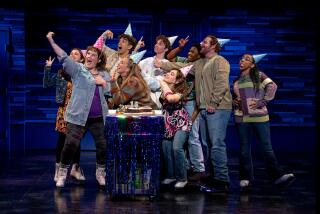Period details cloud tragedy in âViewâ
Of all Arthur Millerâs plays, âA View From the Bridgeâ demands the greatest attention to authenticity. After all, this is his most specifically ethnic play, taking us into the Italian American experience he observed so closely, coming of age in Brooklyn.
The hardscrabble longshoremen filled with pride, the immigrants who arrived with some desperation and enormous hope, the second- and third-generation children who dreamed of stable jobs and strong marriages -- these were not some distant, imagined people like, say, the Puritans of Salem, Mass., whom Miller wrote about in âThe Crucibleâ; these were his neighbors. This was a story Miller chose to tell, in part, because it hit close to home.
But authenticity is an elusive thing, and the harder one has to try, the less likely one is to achieve it. So to say that the South Coast Repertory production of âA View From the Bridgeâ works extremely hard is to praise it for strong craftsmanship and to recognize its limits.
At the center of the hard-working group of actors is Richard Doyle, who plays Eddie Carbone, perhaps the most fully typical of Millerâs working-class heroes, the type of guy who didnât have tragedies written about him until Miller came along. Eddie has worked hard his whole life to support his wife, Beatrice (Elizabeth Ruscio), and Catherine (Daisy Eagan), the orphaned niece he has raised.
To set things in motion, Miller provides Eddie with the simplest of tragic flaws: an unhealthy affection for his niece, a passion that drives him toward inevitable doom once Catherine falls in love with Rodolpho (David Barry Gray), a cousin of Beatrice who arrives illegally from Italy with his older brother Marco (Anthony Cistaro).
Doyle certainly exudes the right masculine ego as Eddie, and the proper sense of the territorial. He is a man of great personal dignity, which only makes his unstated, even unconscious, lust for Catherine more agonizing. But thereâs something missing. With a mustache and curly hair, dressed in the working-class uniform of a plaid flannel shirt and suspenders, this Eddie Carbone often feels more like a museum piece than flesh and blood. Thereâs a sense of caricature here.
A different type of overexposed effort can be seen in Ruscioâs performance, which interprets Beatriceâs seething frustrations as fussiness. Under Martin Bensonâs direction, the acting is not the only element that seems to be working too hard. Benson seems so determined to capture â50s Brooklyn that his designers have put a heavy layer of period over a play that was contemporary when Miller wrote it.
Sure, Miller obviously wanted to give the audience some distance from the intense emotion of the events, and thatâs why he provided a narrator in lawyer Alfieri (Hal Landon Jr.). But Benson has added more layers of distance, with lighting designer Chris Parry bathing the entire stage in the sepia tones of an old photograph, and costumer Angela Balogh Calin dressing Rodolpho and Catherine in outfits that are undoubtedly true to the time but seem so darn self-conscious that you want to see them go shopping rather than converse.
All of this would, and actually could, become irrelevant if the sense of lust and danger that pervade the story were palpable instead of just present. In the best scene, Marco shows his strength by lifting a chair with one hand. Itâs a demonstration of physical strength, and really no more. But to make it potent, we need to sense that Marco is tempted to bash Eddie with the furniture if he continues to disrespect his brother.
*
âA View From the Bridgeâ
Where: South Coast Repertory,
655 Town Center Drive, Costa Mesa
When: 8 p.m. Tuesdays through Fridays, 2:30 and 8 p.m. Saturdays, 2:30 and 7:30 p.m. Sundays
Ends: June 26
Price: $27 to $56
Contact: (714) 708-5555
Running Time: 2 hours, 15 minutes
Mark Brown...Mike
Anthony Cistaro...Marco
Richard Doyle...Eddie
Daisy Eagan...Catherine
David Barry Gray...Rodolpho
Hal Landon Jr....Alfieri
Elizabeth Ruscio...Beatrice
By Arthur Miller. Directed by Martin Benson. Sets by Ralph Funicello. Costumes by Angela Balogh Calin. Lights by Chris Parry. Sound by Karl Fredrik Lundeberg. Fight choreographer Ken Merckx. Production stage manager Jamie A. Tucker.
More to Read
The biggest entertainment stories
Get our big stories about Hollywood, film, television, music, arts, culture and more right in your inbox as soon as they publish.
You may occasionally receive promotional content from the Los Angeles Times.










